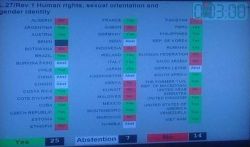HRC votes for second resolution on LGBT

Today, for the second time a resolution on LGBT rights was adopted by the United Nations Human Rights Council. Until 2011, LGBT people have been denied explicit mention in official UN resolutions because a heinous coalition of States maintain that same-sex behavior is sinful, criminal and LGBT people are not deserving human rights. This resolution breaks the stalemate between the coalition for universal human rights and the coalition which advocates to maintain medieval values.
A second small step
The battle to vote on a resolution to adopt LGBT rights as human rights has been going on for a number of years now. In June 2011, the Human Rights Council adopted resolution 17/19 (A/HRC/RES/17/19) – the first United Nations resolution on sexual orientation and gender identity – expressing “grave concern” at violence and discrimination against individuals based on their sexual orientation and gender identity. Its adoption paved the way for the first official United Nations report on the issue prepared by the Office of the High Commissioner for Human Rights (A/HRC/19/41). passed by a vote of 29–19 with three abstentions. The current resolution applauds the report issued by the OHCHR and calls for a further report. This resolution passed on a vote of 25–14, with seven abstentions.
South Africa backing down under African peer pressure
However, the battle has been hard. South Africa, which initiated the last resolution, has backed down in her support for LGBT rights. South Africa was the first country in the world to protect LGBT rights in its constitution. Now, South African Ambassador Abdul Samad Minty made clear he felt torn by this constitutional commitment on one hand and the desire to preserve relationships with other African countries on the other hand. Fellow African States like Uganda and Nigeria have less universal respect for human rights and recently enacted severe anti-LGBT laws. “South Africa believes that no person should fear for their safety or be deprived of their dignity because of their sexual orientation or gender identity,” Minty said.
But he was angry about some Western nations cutting their development aid to influence African policies and to create division on the African continent. To preserve their African relationships, South Africa amended the resolution to become less powerful by only asking for one new report, while the original proposal called for LGBT rights reports to be produced every two years.
Islamic States frame resolution as attack on Islam
The opponents of the proposal were led by Egypt and other members of the Organization for Islamic Cooperation. They framed the resolution as a form of cultural imperialism and an attack on Islam. “We feel there is an attempt to impose uniculturality” that “runs counter to religious and cultural practices of some countries,” said Saudi Arabia’s representative during debate. The language “In my opinion, this is a human rights violation.” Pakistan was more radical. Their representative said that the wider connotation of the words “sexual orientation” would be destructive and hostile to the Muslim faith and to Islamic youth.
Sources:
• http://www.buzzfeed.com/lesterfeder/lgbt-rights-resolution-passes-united-nations-human-rights-co#32if3q2
• http://www.pinknews.co.uk/2014/09/26/un-human-rights-council-passes-landmark-lgbt-rights-resolution/
• http://www.ohchr.org/en/issues/discrimination/pages/lgbt.aspx


